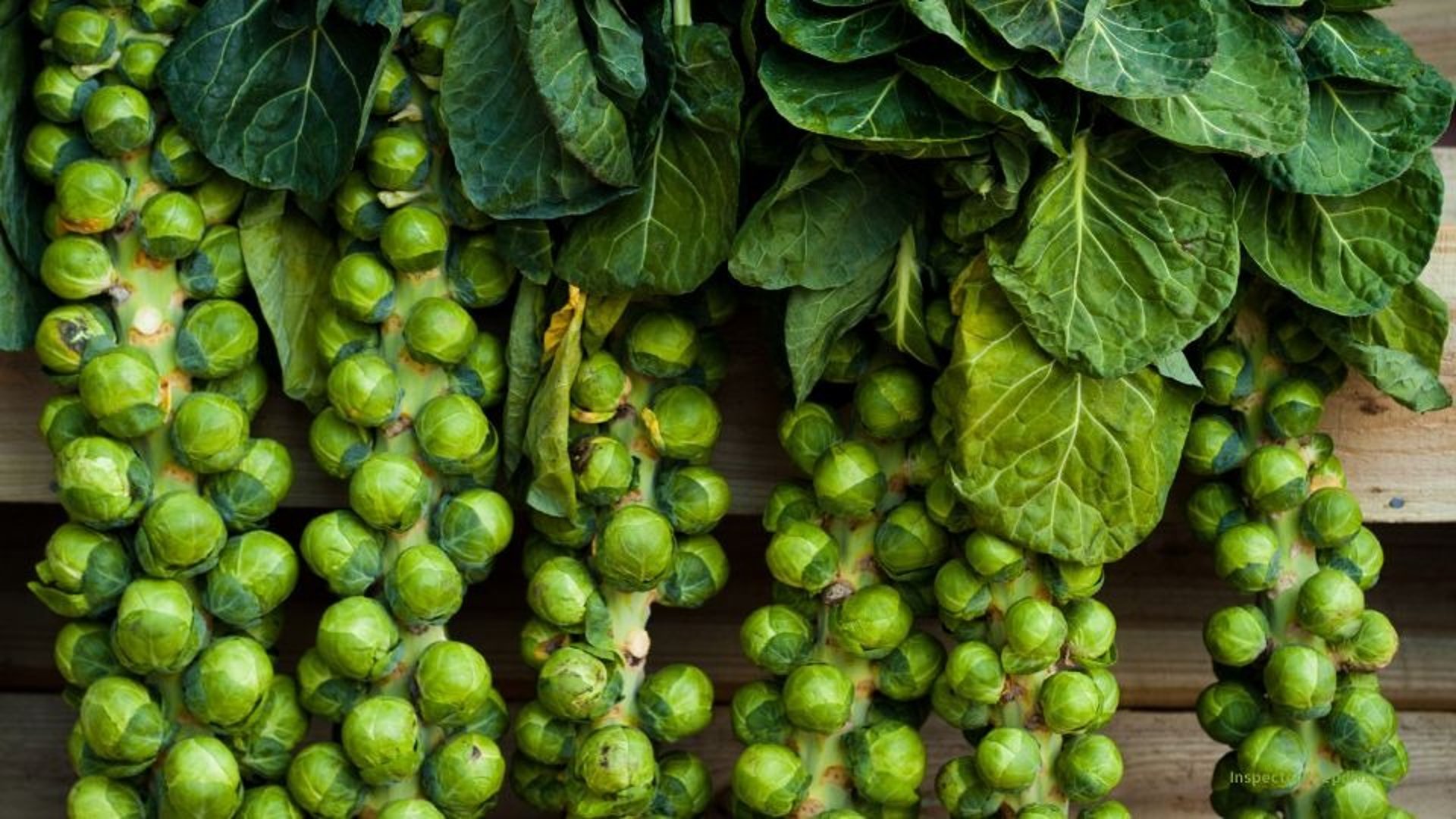
Brussels Sprouts: Gut Health, Immunity, and Anti-Cancer Power

Brussels Sprouts: Gut Health, Immunity, and Anti-Cancer Power
Scientific Name: Brassica oleracea var. gemmifera
What Are Brussels Sprouts?
Brussels sprouts are small, cabbage-like buds that grow along a thick stalk. As a cruciferous vegetable related to broccoli and kale, they are known for their dense texture and earthy flavor. They are often roasted, steamed, or sautéed to bring out their sweetness and reduce any bitterness.
Where Do They Come From?
Brussels sprouts are native to Belgium, hence their name, which refers to its capital city. Today, they are widely grown in the U.S., UK, and Netherlands. They thrive in cool climates, and interestingly, a touch of frost can actually improve their sweetness. They are typically harvested from fall through winter.
Seasonality & Availability
The peak season for fresh Brussels sprouts is from October through March. While fresh sprouts offer the best flavor and texture, they are available year-round in frozen form, making them a convenient option anytime.
How Brussels Sprouts Benefit Your Body
Brussels sprouts do more than just provide nutrients; they actively enhance your health at a cellular level.
Immune and Skin Health: The high Vitamin C content doesn't just support your immune system; it supercharges your body's ability to produce collagen, the essential protein that keeps your skin youthful, your joints flexible, and your blood vessels strong and resilient.
Detoxification Powerhouse: The sulforaphane compound in Brussels sprouts doesn't simply activate detox enzymes; it turbocharges your liver's capacity to neutralize environmental toxins, carcinogens, and metabolic waste products. This powerful antioxidant switches on your body's natural defense mechanisms, enhancing Phase II detoxification pathways that protect your cells from DNA damage and reduce cancer risk.
Gut Health Champion: The fiber content doesn't just promote digestion; it cultivates a thriving community of beneficial gut bacteria that produce essential nutrients, strengthen your immune system, and communicate directly with your brain through the gut-brain axis. These microbes create a protective barrier in your intestines while helping regulate inflammation throughout your body.
Bone and Heart Protector: Vitamin K doesn't merely aid blood clotting; it acts as a traffic cop for calcium in your body, directing it to strengthen your bones while preventing dangerous deposits in your arteries. This ensures proper wound healing while simultaneously protecting your cardiovascular system and building bone density.
Anti-inflammatory Effects: The combination of antioxidants, including kaempferol and quercetin, creates a powerful anti-inflammatory effect that can reduce joint pain, support heart health, and slow the aging process at the cellular level. Regular consumption literally rewires your body's inflammatory response while providing the raw materials for cellular repair and regeneration.
The "Anti" Factors in Brussels Sprouts
Anti-inflammatory: Reduces inflammation due to sulfur compounds like sulforaphane and kaempferol, which inhibit inflammatory pathways in the body.
Antioxidant: Neutralizes free radicals, protecting cells from oxidative stress thanks to high levels of Vitamin C, quercetin, and glucosinolates.
Anti-cancer: Contains compounds like sulforaphane and indole-3-carbinol that may inhibit the growth of certain cancers, particularly breast, colon, and prostate cancer.
Anti-bacterial: Exhibits potent antimicrobial properties, effective against harmful bacteria, viruses, and fungi, including Helicobacter pylori.
Anti-hypertensive: Helps lower blood pressure by relaxing blood vessels and improving circulation due to its rich potassium content.
Nutritional Breakdown
(per 50g cooked Brussels Sprouts)
Vitamins:
Vitamin C: 45 mg (supports immunity and skin health; retains significant amount despite cooking)
Vitamin K: 95 µg (aids blood clotting and bone density; increased absorption when cooked)
Folate: 35 µg (supports cell function and pregnancy health; minimal loss with cooking)
Other Compounds:
Fiber: 2.0 g per 50g (supports digestion and gut bacteria; unchanged by cooking)
Amino Acids: Contains glutathione and sulforaphane, antioxidants tied to detox and immune support (some compounds may increase with cooking)
Minerals:
Potassium: 210 mg (regulates fluid balance and heart health; improved absorption)
Calcium: 18 mg (supports bones and teeth; better absorption when cooked)
Iron: 0.8 mg (aids oxygen transport in blood; enhanced absorption)
Magnesium: 15 mg (involved in energy production and nerve function; better absorption)
Zinc: 0.2 mg (supports immune function and skin healing; slightly improved)
Manganese: 0.15 mg (plays a role in bone development and metabolism; unchanged)
Copper: 0.07 mg (aids iron absorption and connective tissue health; slightly improved)
Selenium: Trace amounts (supports thyroid function and immunity; unchanged)
Macronutrients:
Calories: 25 kcal (low-calorie, ideal for light meals or snacks)
Water: 42 g (keeps you hydrated and supports cellular function)
Protein: 1.8 g (provides essential amino acids for muscle repair)
Total Fat: 0.2 g (mostly unsaturated fats, minimal contribution to daily intake)
Carbohydrates: 5 g (includes natural sugars and dietary fiber)
Dietary Fiber: 2.0 g (promotes digestive health and satiety)
Sugars: 1.2 g (naturally occurring sugars like glucose and fructose)
Potential Risks
Overconsumption of Brussels sprouts can cause gas or bloating due to their fiber content. Their high Vitamin K content may interfere with blood thinners. The sulfur compounds in cruciferous vegetables can also cause strong-smelling gas in some individuals.
Medication Interactions
High Vitamin K may reduce the effectiveness of blood thinners like warfarin. Glucosinolates in large amounts may interact with thyroid medication.
Who Should Be Cautious?
People on blood thinners should be cautious due to high Vitamin K content.
Those with thyroid issues should be mindful, as cruciferous vegetables contain goitrogens.
Individuals with IBS (Irritable Bowel Syndrome) may find that fiber and FODMAPs (fermentable carbohydrates) in Brussels sprouts cause discomfort.
Surprising Truths About Brussels Sprouts
Most people overcook them until soggy; the optimal texture is crispy outside, tender inside.
The outer leaves are often discarded but are edible and nutritious.
Not everyone likes them; taste sensitivity to bitter compounds (glucosinolates) is genetic.
Environmental Impact
Brussels sprouts require moderate water use. Their carbon footprint is low due to widespread local production in the U.S. and Europe. The stems and leaves are edible, which helps reduce food waste.
Best Time to Eat Them
During their peak season from fall through winter.
Eat with healthy fats (like olive oil or butter) to absorb fat-soluble nutrients.
Pair with acidic ingredients (lemon, vinegar) to cut through any bitterness.
Best Ways to Use Brussels Sprouts
Roast halved with olive oil and garlic for a delicious side.
Shave raw into salads for a fresh crunch.
Steam and top with cheese for a simple dish.
Sauté with bacon or balsamic glaze for added flavor.
Avoid boiling, as it leaches nutrients and enhances the sulfur smell.
Label Reading Tips
Look for firm, compact sprouts. Avoid any that are yellowing or soft. Organic labels aren't always necessary, as pesticide levels are generally low. Pre-trimmed versions save prep time but typically cost more.
Storage & Shelf Life
Fresh sprouts: Last 1–2 weeks in the fridge.
Cooked sprouts: Refrigerate for 3–4 days.
Freezing: Preserves them for up to 8 months.
Chef Tips
Trim the base and remove any loose outer leaves. Roast at high heat to caramelize them. Pair with bacon, lemon, or balsamic glaze to balance bitterness. Don't overcook, as it brings out stronger sulfur notes.
Recipes & Meal Ideas
Roasted Brussels sprouts with garlic and Parmesan.
Shaved raw Brussels sprouts in salads with lemon dressing.
Sautéed Brussels sprouts with bacon and balsamic.
Brussels sprouts hash browns.
Mashed Brussels sprouts with potatoes and butter.
The Science Behind Brussels Sprouts
Brussels sprouts contain powerful plant compounds that support liver detoxification pathways, reduce inflammation, and fight oxidative stress. Their fiber promotes gut bacteria diversity, and Vitamin C boosts white blood cell activity.
Glucosinolates: Support liver detoxification pathways.
Sulforaphane: Reduces inflammation and oxidative stress.
Fiber: Promotes gut bacteria diversity.
Vitamin C: Boosts white blood cell activity.
Scientific Breakthroughs As Of 2025
Enhanced Cancer Prevention: Researchers identified a newly bred variety of Brussels sprouts with significantly elevated levels of glucoraphanin (the precursor to sulforaphane), enhancing its cancer-preventive potential, especially for lung and colon cancers.
Gut Health Boost: Studies revealed that regular consumption of Brussels sprouts supports gut health by promoting the growth of beneficial bacteria linked to reduced inflammation and improved digestion.
Blood Sugar Regulation: A clinical trial published in 2025 showed that Brussels sprout extract may help regulate blood sugar levels in individuals with type 2 diabetes due to its high content of plant-based antioxidants and fiber.
Nutrient Bioavailability: New findings demonstrated that cooking methods such as light roasting or steaming preserve over 85% of the vegetable’s Vitamin K, C, and folate content, making it more bioavailable than previously believed.
Natural Food Preservation: Food scientists explored the use of Brussels sprout extracts in natural food preservation, discovering that their antimicrobial properties can extend shelf life in plant-based meat alternatives while boosting nutritional value.
FAQs
Why do Brussels sprouts taste bitter?
This is due to a genetic sensitivity to glucosinolates.
Can I eat the leaves?
Yes, sauté or roast them like the sprouts themselves.
Are frozen Brussels sprouts healthy?
Yes, they retain many nutrients, but avoid boiling them.
Do they help gut health?
Yes, their fiber and prebiotic content support digestion.
Are Brussels sprouts good for skin?
Yes, Vitamin C and antioxidants aid in collagen production.
info@inspectordeepdive.com
© 2025 food.InspectorDeepDive.com. All rights reserved. Content may not be copied or republished without permission.
This article is for informational purposes only. InspectorDeepDive.com does not provide medical advice. Always consult a licensed healthcare provider before making dietary or health decisions.
